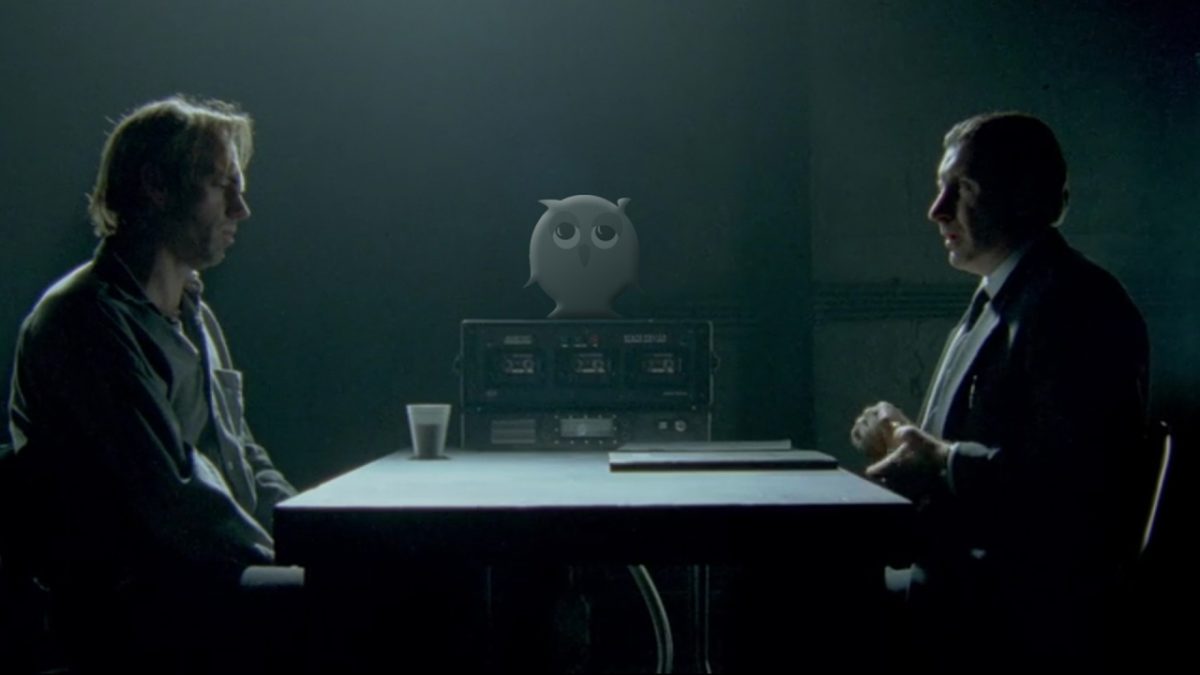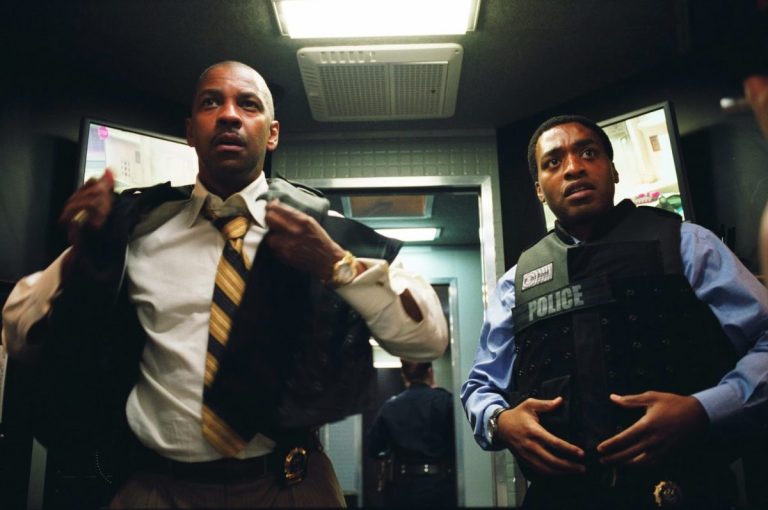Craig Monahan’s The Interview (1998) refuses the conventions of a standard crime thriller; instead, it plays out as a tense psychological duel. The question isn’t simply whether Edward Rodney Fleming committed murder, but whether the detectives pursuing him are themselves compromised. What begins as a seemingly ordinary interrogation unravels into a battle of wits—an exploration of manipulation, fear, and the cracks within the very institution meant to deliver justice.
Spoilers Ahead
The Interview (1998) Plot Summary & Movie Synopsis:
Why Do Steele and Prior Target Fleming?
Detective Sergeant John Steele and his subordinate, Wayne Prior, storm into Fleming’s life with aggression. Their supposed evidence, a handwriting match, a witness statement, and Fleming’s teenage criminal record, feels flimsy. But they aren’t after certainty; they’re after a confession. Steele plays ‘good cop,’ pretending to sympathize, while Prior turns violent when the recorder is off. Together, they pressure Fleming into seeing himself as the main suspect, regardless of how tenuous the case actually is. Their behavior reveals not just desperation to close cases but also a habitual reliance on intimidation and manipulation. Fleming, at first meek and hungry, seems like the perfect target. But as the hours wear on, he begins to realize that their obsession with him gives him a sense of power.
Why Does Fleming Confess?
The turning point comes when Fleming, after demanding food, begins to describe Beecroft’s murder. He recounts it with chilling detail, how he hitched a ride, killed Beecroft on a whim, and took his car. He even claims responsibility for five or six more killings, delivered with a casual detachment that unnerves both Steele and the audience. But why would he confess if he knew it would destroy him? The film suggests two possibilities:
- Fleming as a murderer: His confession is a release, a moment of pride where he flaunts his control over life and death. His smirk and sudden confidence point to a man who enjoys watching the police squirm.
- Fleming as a manipulator: He sees what Steele wants and feeds it back to him. After hours of abuse and false empathy, Fleming realizes that confession, true or false, gets him fed, gets him attention, and puts him in charge of the room.
When Inspector Jackson interrupts and Fleming retracts everything, claiming he lied because of police brutality, the ambiguity deepens. Did he play Steele all along, or did he panic when the stakes grew too real?
What Does Steele’s Downfall Reveal?
Steele is as much a subject of the film as Fleming. He is a detective obsessed with proving guilt, convinced his instincts are enough to override procedure. When the police ethics committee reveals that the entire interrogation was secretly recorded, Steele’s methods collapse under scrutiny: false promises, intimidation, suggestive questioning. Hudson, the ethics officer, delivers the final blow by declaring all of Steele’s work inadmissible. But in a clever twist, Steele records Hudson’s own outburst off the record, flipping the power dynamic once again. Steele knows he is finished, but he also knows how to weaponize corruption against corruption. Where Fleming manipulates survival, Steele manipulates reputation. Both men operate in shades of dishonesty, making it difficult to root for either.
The Interview (1998) Movie Ending Explained:
Was Fleming Really a Killer?

The film leaves this question unresolved by design. Fleming’s confession could be the truth of a remorseless killer, or it could be the desperate invention of a man brutalized into speaking. The key is Fleming’s final grin as he leaves the police station, and his return to hitchhiking. If Fleming is innocent, then he is ironically mimicking the very circumstances Steele accused him of, mocking the police by performing the role they forced onto him. If Fleming is guilty, then the system’s corruption has handed a predator his freedom, setting him loose to kill again. The genius of “The Interview” is that both readings coexist. Fleming’s grin is either the satisfaction of beating the police at their own game or the chilling confidence of a killer who knows he can never be caught.
What Does the Ending Mean?
The ending underscores the futility of seeking absolute truth in a flawed system. Steele’s methods ensured that even if Fleming was guilty, justice would not be served. The police destroyed their own case through misconduct, and Fleming, whether killer or victim, walks free. Fleming’s final hitchhiking scene is the ultimate provocation. The audience is left unsettled. If he is a murderer, he is about to repeat the cycle; if not, he is forever branded as one. Either way, the world outside the interrogation room remains a dangerous place. The real horror of “The Interview” lies not in Fleming’s potential crimes but in the collapse of trust between law enforcement and truth, between confession and coercion, between guilt and innocence. The system cannot distinguish, and neither can we.
Fleming and Steele as Mirror Figures
One of the most striking aspects of “The Interview” is how Fleming and Steele gradually start to resemble one another. Initially, the two appear to be polar opposites, with Fleming being the implied weak, displaced suspect and Steele being the strong, in-control detective. But as the interrogation process unfolds, that resemblance pulls into focus. Both men are men of control. Steele bullies, rewards, and manipulates individuals to gain control over and influence them. Fleming, as soon as he realizes how desperate the detectives are for information, reverses the power flow of the interrogation, weaponizing his confession and silence for the sake of power.
Neither man is a truthful narrator. Steele lies about evidence and bends procedural rules to craft the story he wants to have. Fleming lies about his own life as a participant, oscillating between denial and confession, leaving all observers, including the audience, to question the truth of the matter. Both are prisoners of pride. Steele is nonetheless unable to concede anything reliable to Hudson or Jackson, feeling that any objection is an undermining challenge to his power. At the same time, Fleming is aware of the power he has and cannot resist grinning at the detectives’ frustration of surrendering the reveal and flaunting his power at the expense of masking or admitting wrongdoing.
By the end, the interrogation feels less like detective versus criminal and more like two men locked in a battle of egos. Each lies, manipulates, and records the other to secure victory. In that sense, “The Interview” is not just about whether Fleming is guilty, but about how corruption and deceit blur the line between criminal and investigator until they become reflections of each other.






